Manga: One Punch Man
(they actually sell that oppai hoodie, by the way)
Kanji of Oppai
The word oppai does not have kanji. It's sometimes written with hiragana, as おっぱい, and sometimes written with katakana, as オッパイ, but it's not written with kanji. Except in one wordplay case.Chippai ちっぱい
The word chippai means "small breasts" in Japanese. It's a slang, a contraction of chiisana oppai 小さなおっぱい, "small boobs," chippai ちっぱい.Male Oppai
Although oppai is technically gender-neutral, it's vastly used to refer to female breasts, not to male breasts.Hence the wordplay oppai 雄っぱい, forcibly written with the kanji for "male," osu 雄, is used to refer to male breasts exclusively.
This is the same principle used in the gender-bender term onnanoko 雄んなの子.
Chest, Breast & Nipple Nomenclature
The word oppai is a slang. Here are some Japanese words to say "boobs" that are not slangs.- mune 胸
Chest.
Breasts. (sometimes.)- This is the chest that's part of the body. Not to be confused with:
- takarabako 宝箱
Treasure chest. - hako 箱
Chest. Box. (becomes bako as suffix above because of rendaku 連濁.)
- chibusa 乳房
Breast.
Udder. - chikubi 乳首
Nipple.- Written with:
- kubi 首
Neck. - Just like:
- tekubi 手首
Wrist. - te 手
Hand. (so "wrist" is the "hand-neck.")
- chichi 乳
Breast milk.
Breast. - gyuunyuu 牛乳
Cow milk.- ushi 牛
Cow. - These two words have nothing to do with human breasts!
- ushi 牛
- bonyuu 母乳
Mother's milk.- haha 母
Mother. - bogo 母語
Mother language. Native language.
- haha 母
The following terms are a bit more technical:
- kyoubu 胸部
Chest. Thorax. - nyuurin 乳輪
Areola. - nyuutou 乳頭
Teat. - kanbatsu nyuutou 陥没乳首
Inverted nipple. "Sunken teat."
On the other hand, this is a slang:
Anime: Shimoneta to Iu Gainen ga Sonzai Shinai Taikutsu na Sekai 下ネタという概念が存在しない退屈な世界 (Episode 1)
- biichiku B地区
"District B."
Nipple. (because it's chikubi.)
Breast Sizes
Here are some Japanese words related to the breast size.- basuto バスト
Bust. - saizu サイズ
Size. - suriisaizu スリーサイズ
Three-sizes.
Bust-hip-waist measurements.
(by the way, Japan uses "centimeters," senchi センチ.) - kappu カップ
Cup. - ei-kappu Aカップ
A-cup.- ei, bi, shii, dhii A, B, C, D.
See: katakanized alphabet letters.
- ei, bi, shii, dhii A, B, C, D.
The following phrases are commonly used to refer to women with small or big chests:
- mune ga chiisai 胸が小さい
"The chest is small." - mune ga ookii 胸が大きい
"The chest is big."
- kanojo wa atama ga ii 彼女は頭がいい
About her: head is good.
[She's smart.] - kanojo wa mune ga ii 彼女は胸が大きい
About her: chest is big.
[She has big breasts.]
Terms for Apparent Breast Sizes
The following terms are used to refer to apparent breast sizes.Note that they are not precise or accurate in any way, even the cup sizes. And also note that what's considered small or big in Japanese and in the US is probably different.
The following terms refer to small breasts:
- munyuu 無乳
"No breasts." (literally, but may be used as an exaggeration.)
AAA to AA-cup. - sentakuita 洗濯板
Washboard. (as in flat as a board.)
(a slang used to make fun of others.)- The shape of a washboard resembles the ribs at the center of a flat chest.
- Shinderera basuto シンデレラバスト
Cinderella bust.
AAA to A-cup.
(not very common.) - hinnyuu 貧乳
"Poor breasts."
Small breasts. Tiny breasts.
Flat-chest.
B-cup and less.
(may be offensive.) - binyuu 微乳
Small breasts. "Delicate breasts."
B-cup or smaller.
(the less offensive term, finally.)
For a "normal" breast size, it can be called literally "normal," futsuu 普通, or "normal breasts," funyuu 普乳. The following terms refer to large breasts.
- kyonyuu 巨乳
"Giant breasts." (remember the anime? Shingeki no Kyojin 進撃の巨人?)
Huge breasts. Big breasts. - dekapai デカパイ
(same as above, but from dekai でかい, "huge," instead.) - bakunyuu 爆乳
"Explosive breasts." (♫ bakuretsu bakuretsu EXPLOSION!!11 ♫)
Enormous breasts.
G-cup and above.
(you can assume this is bigger than kyonyuu.) - chounyuu 超乳
"Super breasts." (literally.)
Gigantic breasts.
(often refers to physically impossible breasts. Like, so big you'd have trouble walking through a door with those things. So they usually don't refer to real breasts but drawings and fake pictures, digitally altered, etc.)
The term manyuu 魔乳 is also used to refer to "large breasts," but it originally meant "witch's milk" instead. (the word for "witch" is majo 魔女).
Manga: Seitokai Yakuindomo 生徒会役員共 (Volume 3, Chapter 42, Page 58, おっぱいの美学)
- Context: Shichijou Aria 七条アリア explains to Amakusa Shino 天草シノ the hardships of having big breasts.
- tatoeba Shino-chan no
suki na hito ga kyonyuu-zuki no
baai
たとえばシノちゃんの好きな人が巨乳好きの場合
For example, in the case [in which] Shino-chan's liked person is big-breasts-liking...- For example, [imagine] the person [that you] like likes big breasts...
- baai 場合
Hypothetical case. (noun.)
Imagine that... (whatever come before this word.)
You have an adjective qualifying this word, describing what "hypothetical case" you're supposed to "imagine." - suki na hito 好きな人
Person [whom you] like. Romantic interest. - zuki 好き
-liking. (suffix version of suki 好き, "liking.")
-lover. Someone who likes something. Is liking something.
- doryoku suru yochi ga aru-n-desho?
努力する余地があるんでしょ?
There's room [for you] to put effort, right?- i.e. you can still do something about it.
- Just grow some breasts, Shino-chan!
- demo watashi no suki na hito ga hinnyuu-zuki na baai
でも私の好きな人が貧乳好きな場合
But if the person I like likes small breasts. - mou dou nimo naranai yo
もうどうにもならないよ
Already won't become anyhow.- Won't take any shape. Won't happen.
- It's already hopeless. Futile.
- There's nothing I can do about it.
Reference
Sizes according to this article:Loli Large-Breasts
In English, the term "oppai loli" is used to refer to a loli character with disturbingly over-sized breasts. That's an eisei-wago made up by western anime fans and isn't a term used in Japanese. There, rori kyonyuu ロリ巨乳 is used instead.Petite & Large-Breasted
There are also terms for characters, and people, who aren't underage, but simple of small stature, and have large breasts that contrast with their size.One such term is kogara kyonyuu 小柄巨乳, "small-body-size large breasts," which is pretty straightforward in meaning.
Another term is toranjisuta guramaa トランジスタグラマー, literally "Transistor glamour," which is a bit hard to explain.
The term "glamour" used to be used toward people with a hourglass cheap, large hips, tiny waist, large breasts. And it was thought tall height was required for a woman to have such "glamour."
The term "transistor" was then coined for short women who were meaty enough to met said glamorous expectations.
Bigger Than You Thought
The term kakure kyonyuu 隠れ巨乳, literally "hidden huge breasts," refers to a character, or person, that has large breasts, but because of the clothing they usually wear or are wearing, you can't tell they actually have large breasts until they "remove (their clothes)," nugu 脱ぐ.This term follow the same pattern as kakure sato 隠れ里, "hidden village," like in Naruto, or kakure ota 隠れオタ, "hidden ota[ku]," a type of otaku that hides, or simply doesn't let show, the fact they're an otaku.
Tropes
There are a lot of tropes involving breasts in anime. Large breasts, in particular, are pretty much always followed by phrases like:- My back hurts.
- I need to buy a new bra.
- This shirt feels tight around my chest.
- My bra snapped.
And so on. But some tropes are evolved. They have terms for them. And I'll list them below. Some of the words contain only the pai ぱい part of oppai おっぱい, as the o お is often thought to be a prefix.
Boob-Job
A paizuri パイズリ is the act of "boob-rubbing." That is, a "boob-job," the sexual practice, not the surgery kind.
Anime: Shimoneta to Iu Gainen ga Sonzai Shinai Taikutsu na Sekai 下ネタという概念が存在しない退屈な世界 (Episode 2)
- Pic unrelated: a woman eating a mushroom.
Groping, Feeling or Touching Boobs
The verb momu 揉む means something like "massaging" something which is soft, and is used when talking about "groping" or "feeling" boobs.The verb washi-dukami 鷲掴み combines the word for the animal "eagle," washi 鷲, with the verb "to seize," tsukamu 掴む, and refers to more forceful groping in which one'd open their hand like an eagle's foot or talons. The following are tags used in Pixiv concerning the practice:
- chichimomi 乳揉み
Boob-groping. (softer version.) - chichidukami 乳鷲掴み
Boob-groping. (harder version.) - serufu-chichimomi セルフ乳揉み
Self boob-groping.
(see anime movie: Your Name, Kimi no Na Wa 君の名は.) - haigo kara munemomi 背後から胸揉み
haigo kara chichimomi 背後から乳揉み
ushiro kara chichimomi 後ろから乳揉み
Chest-groping from behind.
Boob-groping from behind. - pai tacchi πタッチ
pai tacchi パイタッチ
Boob-touch.
Nipple Censorship
In Japanese, the slangs seefu セーフ and auto アウト, literally "safe" and "out" respectively, probably coming from baseball terms, refer to when something is within the rules or outside the rules, whether or not it has crossed a line, and it's sometimes used in respect to censorship in TV, manga, etc.When this comes to boobs, everything is seefu, except for the nipples for some bizarre reason, so they are sometimes auto. Here's a summary of nipple censorship in manga for aimed for children and general audiences:
- Male nipples.
seefu セーフ - Female nipples.
(also known as: "Female-Presenting Nipples.")
auto アウト - Hideyoshi nipples.
auto アウト
Anyway, because of this, TV and magazines have to avoid showing certain nipples with some creative bra replacements, while at the same time coming up with ways to show tits or emphasize their sexiness without crossing the seefu-auto line.
These things have developed into tropes, and there are terms for them.
Girigiri Seefu ギリギリセーフ
A "barely safe," girigiri seefu ギリギリセーフ, situation would be the so-called rinchira 輪チラ, which is when you get a glimpse of the "areola," nyuurin 乳輪, so you can know that nipples do exist. However, since not even half of the nipple is shown, it's not auto, so it's seefu, probably.This term is related to panchira パンチラ, which is a "glimpse of panties."
Necktie on Boobs
A nekupai ネクパイ is when a character has a "necktie," nekutai ネクタイ, which lands in the very middle of their boobs, oppai, emphasizing them.
Character: Makise Kurisu 牧瀬紅莉栖
Anime: Steins;Gate (Episode 3)
Anime: Steins;Gate (Episode 3)
In characters with large breasts, the necktie sometimes becomes partially hidden behind them.
Character: Asami Lilith 浅見リリス
Anime: Trinity Seven (Episodes 1, 2, 4)
Anime: Trinity Seven (Episodes 1, 2, 4)
Pi-Slash
The π/, "pi-slash," paisurasshu パイスラッシュ, or just paisura パイスラ, is when a strap of a backpack crosses (slashes) the chest diagonally, emphasizing the boobs, oppai. Like o/o or o\o.Straps of weapons, like quivers of arrows, guns, also count, as do seat belts, and so on, so long as they cross between the breasts.
Character: Kyoudou Maya 経堂麻耶
Anime: Sabage-bu'! さばげぶっ! (Episode 2)
Anime: Sabage-bu'! さばげぶっ! (Episode 2)
Cleavage Window
A tanima hooru 谷間ホール, literally "cleavage hole," sometimes called "cleavage window" in English, is when a character's clothes are in such way that it leaves a hole open over their breasts, showing their cleavage. This can happen in a number of ways, including:- The design of the clothing had a hole right from the start.
- Because of big breasts, the character unbuttons part of their clothes, creating the hole.
- The clothes are too small and the button bursts out.
- The clothing is ripped for some reason.
Etc.
Character: Kanroji Mitsuri 甘露寺蜜璃
Anime: Kimetsu no Yaiba 鬼滅の刃 (Episode 22, After-Credits Scene)
Anime: Kimetsu no Yaiba 鬼滅の刃 (Episode 22, After-Credits Scene)
Boob Bag
A chichi bukuro 乳袋 refers to "boob bag" found in the design of anime character clothes who have boobs. Essentially, instead of the clothing being deformed by the boobs, in a curve shape, like a D, they just seem to be created with a compartment for form-fitting the boobs perfectly, like a P.
Character: Darkness ダクネス
Anime: Kono Subarashii Sekai ni Shukufuku wo! この素晴らしい世界に祝福を! (Episode 11, OVA)
Anime: Kono Subarashii Sekai ni Shukufuku wo! この素晴らしい世界に祝福を! (Episode 11, OVA)
Boob Tent & Boob Curtain
Although not as common, the complementary terms chichi-tento 乳テント, "boob tent," and chichi-kaaten 乳カーテン, "boob curtain," refer to when clothes are stretched vertically by boobs forming a tent, and when the cloth is left hanging in front of the stomach like a curtain, respectively.Underboob, Sideboob, Overboob
The terms shitachichi 下乳 and shitapai 下パイ mean "underboob" in Japanese, which is when only the bottom part of the breast is visible, and the nipple and above are hidden somehow or clothed.The terms yokochichi 横乳 and yokopai 横パイ mean "sideboob" in Japanese, which is when only the left or right side of the breast is visible, and the nipple and beyond are hidden somehow or clothed.
The terms uechichi 上乳 and uepai 上パイ mean "overboob" in Japanese, which is when only the top part of the breast is visible, and the nipple and below are hidden somehow or clothed. Since this case is particularly trivial these terms aren't used as often.
The term hamichichi ハミ乳 refers to any of the cases above, where breasts hamidasu 食み出す, "protrude," "stick out," of the clothing. Besides that, munechira 胸チラ is one kind of chiralism referring to "catching a glimpse of the chest."
Character: Luna ルナ
Anime: Kono Subarashii Sekai ni Shukufuku wo! この素晴らしい世界に祝福を! (Episode 5)
Anime: Kono Subarashii Sekai ni Shukufuku wo! この素晴らしい世界に祝福を! (Episode 5)
No Bra
The term noo-bura ノーブラ, literally "no bra," is when a character is, well, literally not wearing a bra. However, they're wearing some sort of top or depicted in a way that shows underbood, sideboob, etc. so you know they're not wearing a bra.This term isn't used refer to bare breasts or nipples showing, etc. Although it may be used when they're almost shown, the point is in knowing the fact the character isn't wearing a bra right now and is probably not going to be a bra for a while after until they change clothes or something.
Character: Miyamizu Mitsuha 宮水三葉
Anime: Your Name., Kimi no Na wa. 君の名は。 (Movie)
Anime: Your Name., Kimi no Na wa. 君の名は。 (Movie)
The term noopan ノーパン refers to a "no panties" situation.
Hand Bra
A "hand bra," te-bura 手ブラ, is when a character covers their breasts with their "hands," te 手, as if they were their "bra," bura ブラ
Character: Sento Isuzu 千斗いすず
Anime: Amagi Brilliant Park, 甘城ブリリアントパーク (Episode 1)
Anime: Amagi Brilliant Park, 甘城ブリリアントパーク (Episode 1)
This often happens when the character is in the infamous beach episode and their top is washed away, or it's that infamous barging-into-changing-room scene, or bath scene, or hot springs scene.
Anyway, they cover their boobs. Also hands being handy as they are, it doesn't really matter their exact position covering the boobs. Common patterns include:
- Left hand on left boob, right hand on right boob.
The most simple, but most unnatural one. - The opposite: right on left, left on right. A cross.
Ironically the most natural one. - Single-arm: palm over one boob, forearm covering the other.
The other arm tries to grab the bra back or something.
Hair Bra
A "hair bra," kami-bura 髪ブラ, is when a character somehow covers their breasts with their "hair," kami 髪. This, obviously, only happens if the character has long hair. It would be an incredible feat for a short-haired girl to achieve.An English term for this is Godiva Hair, named after the 11th century Countess of Mercia who rode a horse naked with hair covering her breasts. [Godiva Hair - tvtropes.org, accessed 2019-03-09]
Character: Quinella クィネラ
Anime: Sword Art Online: Alicization (Episode 19)
Anime: Sword Art Online: Alicization (Episode 19)
It's a well known fact that when a character's boobs are exposed and they are not covering them with their hands, their hair just magically hurries up to land on the stop.
I'm not even joking. By some unspoken law of the anime-verse, long hair is physically magnetized toward a girl's boobs. They literally won't abandon those nipples no matter what awkward pose the character takes. Truly an intriguing marvel of anime physics.
Character: Zero Two ゼロツー
Anime: Darling in the FranXX (Episode 1)
Anime: Darling in the FranXX (Episode 1)
One Boob Visible
When a character has one entire boob visible but not the other, the term is hen'nyuu 片乳, written with the kanji for the word "one-side-of-two," kata 片.Obviously, this isn't seefu, this is auto, completely auto, like, only maybe Gunbuster can pull this off and stay seefu, unless we're talking about a guy, then it's another story. After all, guys' nipples are seefu.
Triumphant Tits
The term doyachichi どや乳 refers to situations where a character seems proud or triumphant and their breasts are emphasized somehow. It comes from doyagao ドヤ顔, which refers to the face of triumph.An example of this: the "tapioca challenge," tapioca charenji タピオカチャレンジ, which is about using one's chest as a tapioca cup holder.
Breast Expansion
The term bounyuu 膨乳 refers to a scenario where a character grows boobs, which would be called "breast expansion" in English. It's written with the same kanji as the verb "to expand," fukuramu 膨らむ.This rarely happens in anime, it's mostly drawings made by artists around. If the character is depicted growing boobs because she's drawn literally growing up—after all, boobs grow with age, or so dozens of flat-chested high school girl characters in comedy anime would say—then it's otona-ka 大人化, "adult-fication."
If the character is male, but grows boobs because he's depicted turning into a woman, then it's nyotai-ka 女体化, "female-body-fication."
Note that bounyuu refers to the breast-growing scenario. If an artist simply draws a flat-chested character with big breasts, then it's kyonyuu-ka 巨乳化. Similarly, a big breasted character drawn flat-chested is hinnyuu-ka 貧乳化.
Etymology
It's unclear where exactly the word oppai came from. There are many theories, two of which are:- It came from wowo umai ををうまい. The wowo part I'm not sure what it means, but umai means "tasty," implying it's probably about breast milk.
- It came from onaka-ippai お腹一杯, "stomach full," which also implies it's about breast milk.
Reference: おっぱい - gogen-allguide.com.
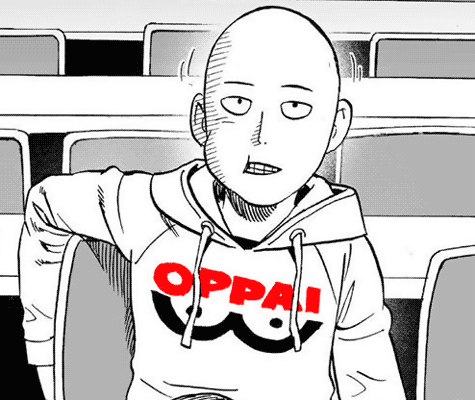
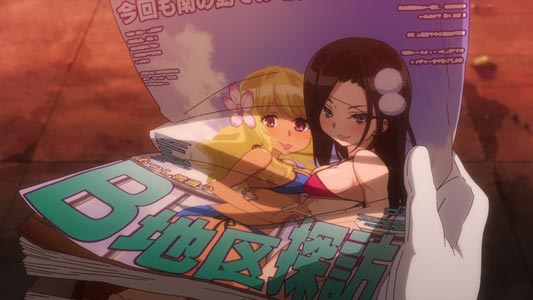
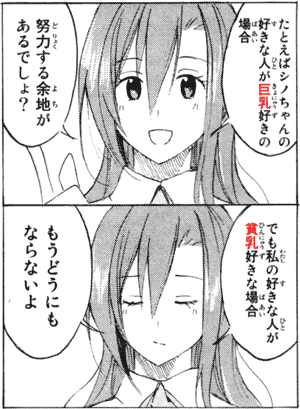
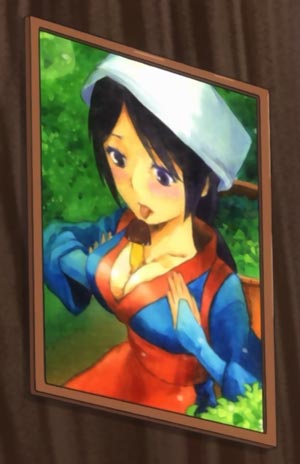
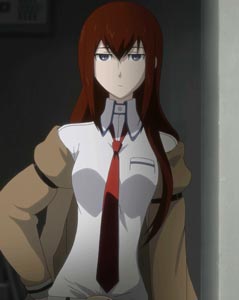
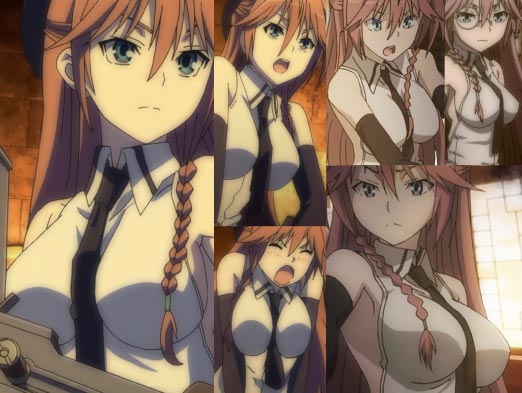
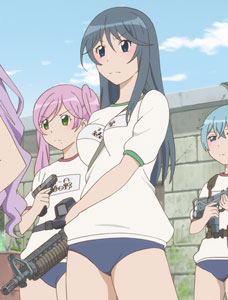
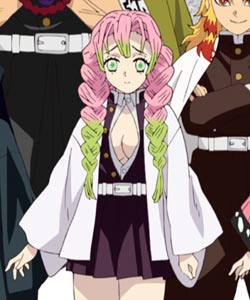
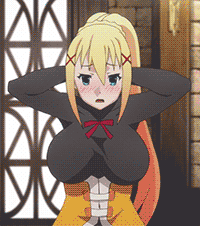
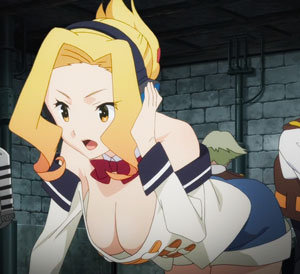
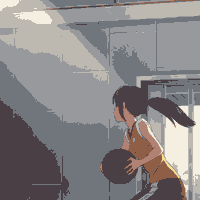

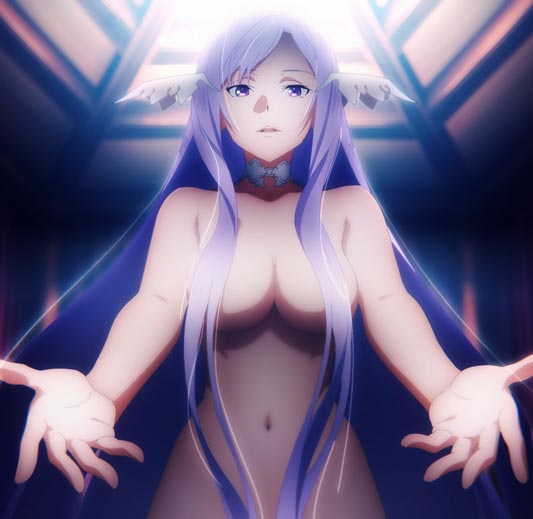
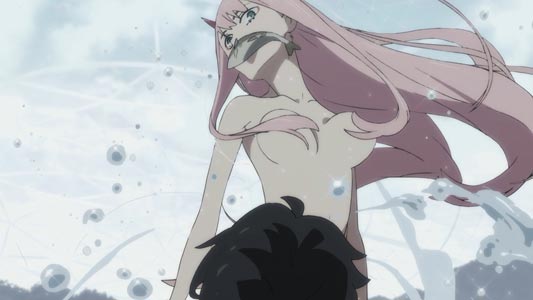
I came from google after searching for the meaning of a tag from pixiv, and there's no comments on this glourious post? Thanks a lot for this, man, learned much more than what I initially came here for!
ReplyDeleteYou're a man of culture indeed
ReplyDeleteIn the Hiragana form for Oppai, why is there a tsu after "O"? Doesn't that make it Otsupai?
ReplyDeleteIt's a small っ.
DeleteGreat post! Man of culture indeed.
ReplyDeleteA very informative post.
ReplyDelete